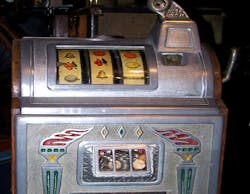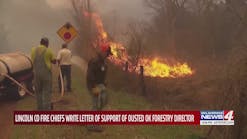Can the fire service take credit for a heroic save if we do not take responsibility for a tragic loss? The manual fire protection paradigm (firefighters responding on fire apparatus) relies on chance; the automatic fire protection paradigm (smoke alarms and fire sprinklers) is based on science, research, engineering, codes, enforcement and education. I want to ask: are we firefighters or gamblers?
I learned about gambling at a very early age; dad was a member of a national fraternal organization that had a cloche room in the back of the meeting hall hiding a secret. When the correct levers were moved, the wall opened to reveal four slot machines, better known as one-armed bandits. The machines were old, no flashing lights just mechanical bells. You pulled a lever, three wheels spun, and bars, cherries, oranges, or a blank space resulted. Each slot machine only took one real coin (penny, nickel, dime, quarter). Mom and dad did not give me money to play the game, but I was allowed to use my money. It did not take me long to learn the glory of victory and the agony of defeat. An important lesson I keep to this day. When it comes to gambling, the casino always wins so the players must lose.
Every fire is a gamble
My next gambling lesson came from Professor Frank Brannigan. He taught me the "Slot Machine" theory of fire protection. The bells ring and the lights flash when a jackpot hits if we save someone heroically, but in the end, the casino always wins. Civilians die and firefighters die. The casino will keep winning until we change our American fire culture paradigm.
How many homes have working smoke alarms in your first-due area? What percent of buildings have fire sprinklers? How much time do you spend on addressing these two questions? Do we whit for a fire death across the street from the fire station to check and install smoke alarms? Do we whit for a firefighter death in a vacant building to change our strategies and tactics? Do we give awards to firefighters who violate SOPs and safety standards?
Only two states, California and Maryland, plus the District of Columbia, have mandatory residential fire sprinkler codes for new residential construction including one- and two-family dwellings. Has the fire service put as much political effort in fire sprinkler codes as firefighter medical costs and death benefits? Does your state legislature perpetuate the slot machine theory of fire protection?
Death by fire code
Chief Allen Brunacini states, “Civilians die in fires according to code.” I will add that firefighters also die by the code and our culture. Firefighter injury and death is not part of the job. Everyone Goes Home cannot be based on chance. When you are at the fire station are you a gambler or firefighter? What do you do every day to change the odds and bet the casino? Spend some time checking smoke alarms. Wear your seat belt on every call. Stop at red lights. Get your political action committee to support mandatory residential fire sprinklers. Perform every task 100 percent correct 100 percent of the time. That takes courage, especially when everyone around you is not. Running into a burning building without PPE and SCBA is not courageous or professional. It is something that gets us killed.
Addictions feel good, but we do not see the damage being done to our body, family, society and culture. We need to detox from the adrenaline high. The fire service needs to lead the way for the American fire culture to adopt an automatic fire protection paradigm for the 21st century.
Remember, when the lights flash and the siren blares on the fire apparatus, we are playing the fire casino game. Don’t let the fire bandit win, because we and the public lose more than money!
DR. BURTON A. CLARK, EFO, has been in the fire service for 44 years. He was a firefighter in Washington, DC, assistant fire chief in Laurel, MD, and the Management Science Program Chair at the National Fire Academy. Clark has a BS is in business administration from Strayer University, an MA in Curriculum & Instruction from Catholic University and a Ed.D. in adult education from Nova Southeastern University. He studied fire science at Montgomery College with Professor Frank Brannigan, Emergency Management at the Emergency Management Institute, National Security at the National Defense University, and is a graduate of the National Fire Academy Executive Fire Officer (EFO) Program. He is a nationally certified Fire Officer IV, Chief Fire Officer Designee for nine years, and an Eagle Scout mentor. Clark writes, lectures and teaches fire service research, safety, culture and professional development worldwide. Find out about his book, I Can't Save You But I'll Die Trying at americanfireculture.com. He can be reached at [email protected].






